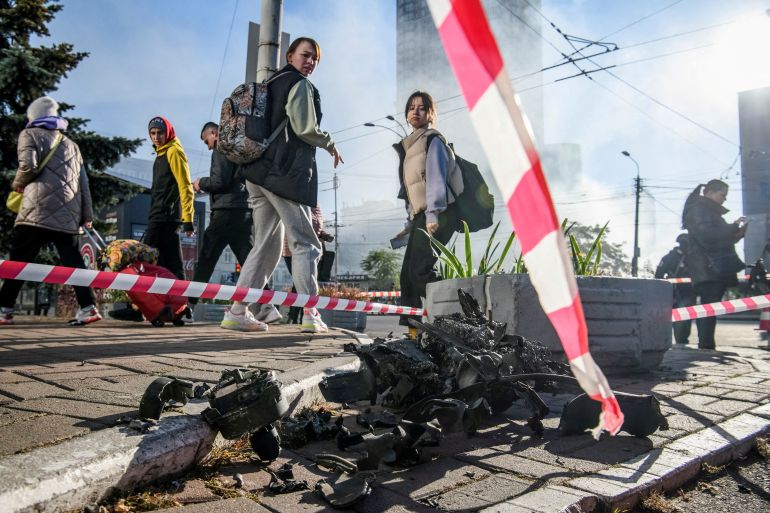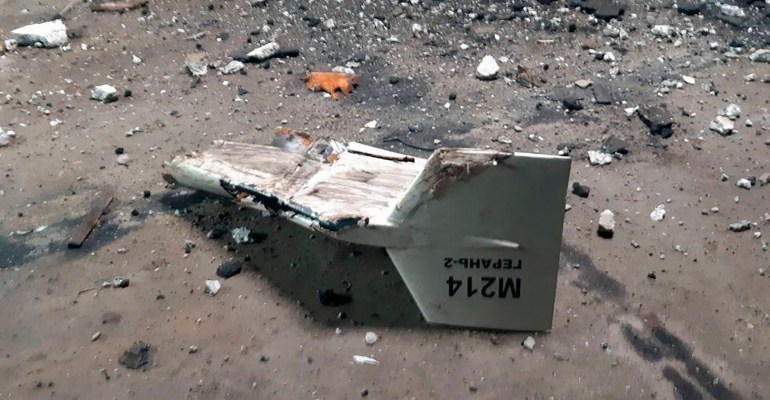Russia, Iran defiant amid UN pressure over Ukraine drones
Russia and Iran insist United Nations has no mandate to inspect the ‘kamikaze’ drones, amid accusations they came from Tehran.

Russia has warned the United Nations against investigating its use of drones in Ukraine, amid accusations the weapons came from Iran and were used in violation of UN arms restrictions on the Middle Eastern country.
The United States, France and the United Kingdom called a closed-door Security Council meeting on the drones after an attack on Kyiv on Monday that killed at least five people, and caused widespread damage to power stations and other civilian infrastructure.
Keep reading
list of 4 itemsNew wave of Russian air raids hits Ukrainian cities, energy sites
UN finds Russian ‘pattern of rape’ and other abuses in Ukraine
‘We were told that’s it, now you’re mobilised’
Ukraine says its military has shot down more than 220 Iranian drones, formally known as uncrewed aerial vehicles (UAV), in little more than a month and has invited UN Secretary-General Antonio Guterres to Ukraine to inspect some of the wreckage it has collected.
Speaking after the Security Council meeting on Wednesday, Russia’s Deputy UN Ambassador Dmitry Polyanskiy insisted the weapons had been made in Russia and condemned “baseless accusations and conspiracy theories”.
He called on Guterres and his staff to “abstain from engaging in any illegitimate investigation. Otherwise, we will have to reassess our collaboration with them, which is hardly in anyone’s interests,” he told reporters.
The US and European Union say they have evidence that Iran supplied Russia with Shahed-136s, low-cost drones that explode on landing. Washington says any arms transfer was in contravention of UN Security Council Resolution 2231 which is part of the 2015 Joint Comprehensive Plan of Action (JCPOA), a now moribund deal to curb Iran’s nuclear activities and prevent the country from developing a nuclear weapon.

Tehran denies supplying the drones to Russia and earlier this week said it was ready for “dialogue and negotiation with Ukraine to clear these allegations” after Foreign Minister Dmytro Kuleba said Ukraine should break diplomatic ties with Tehran.
On Wednesday, Iran’s UN envoy, Amir Saeid Iravani, rejected the “unfounded and unsubstantiated claims” on the drone transfers and said that Tehran, which has abstained in votes on the war, wanted a “peaceful resolution” of the conflict, which began when Russia sent its troops into Ukraine on February 24.
Iravani said Ukraine’s invitation “lacks any legal foundation” and called on Guterres “to prevent any misuse” of the resolution and UN officials on issues related to the Ukraine war.
“Iran is of the firm belief that none of its arms exports, including UAVs, to any country” violate resolution 2231, he added.
EU prepares sanctions
Under the 2015 resolution, a conventional arms embargo on Iran was in place until October 2020.
But Ukraine and its Western allies argue that the resolution still includes restrictions on missiles and related technologies until October 2023, and can encompass the export and purchase of advanced military systems such as drones.
French UN Ambassador Nicolas de Riviere said Guterres has a “clear mandate twice a year to report on all these things and to make technical assessments, so I think the UN secretariat will have to go and will go”.
Guterres reports twice a year to the Security Council — traditionally in June and December — on the implementation of the 2015 resolution. Any assessment of the drones in Ukraine would probably be included in that report.
“As a matter of policy, we are always ready to examine any information and analyse any information brought to us by Member States,” UN Spokesperson Stephane Dujarric said on Wednesday.
Today I raised in the Security Council the UK’s serious concerns over Iranian drones being used to target civilians in Ukraine by Russia.
The Iranians have denied this but it doesn’t stand up to scrutiny.
Council members have asked the UN to investigate. 1/2
— Ambassador James Kariuki (@JamesKariuki_UN) October 19, 2022
The EU is expected to approve sanctions over the drones ahead of a summit that starts on Thursday in Brussels.
A list seen by the AFP news agency showed the 27-nation grouping would take action against three senior military officials, including General Mohammad Hossein Bagheri, the chief of staff of Iran’s armed forces, as well as drone maker Shahed Aviation Industries, an aerospace company linked to the country’s Revolutionary Guards.
Nabila Massrali, spokeswoman for EU foreign policy chief Josep Borrell, said the bloc had “gathered our own evidence” and would prepare “a clear, swift and firm EU response”.